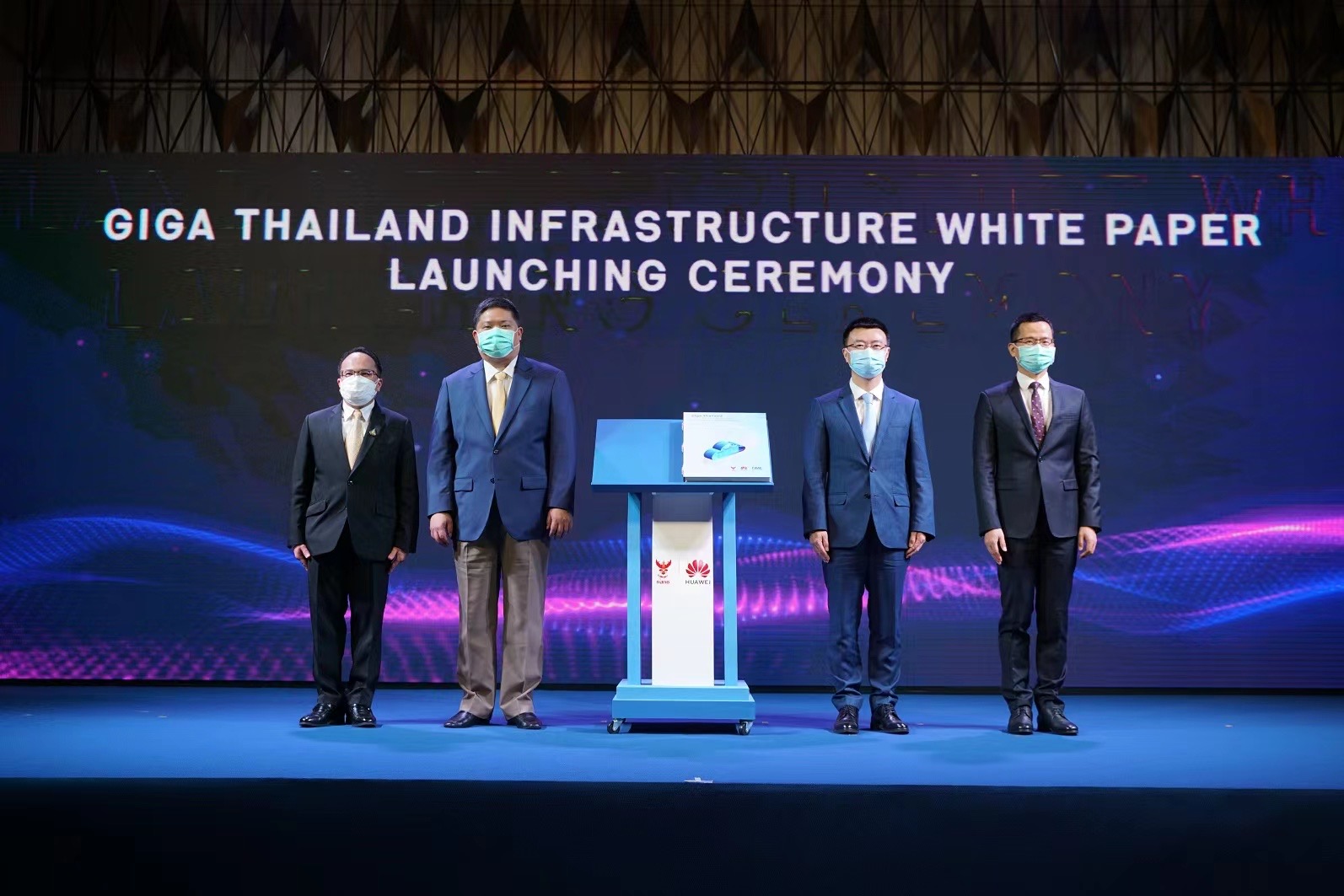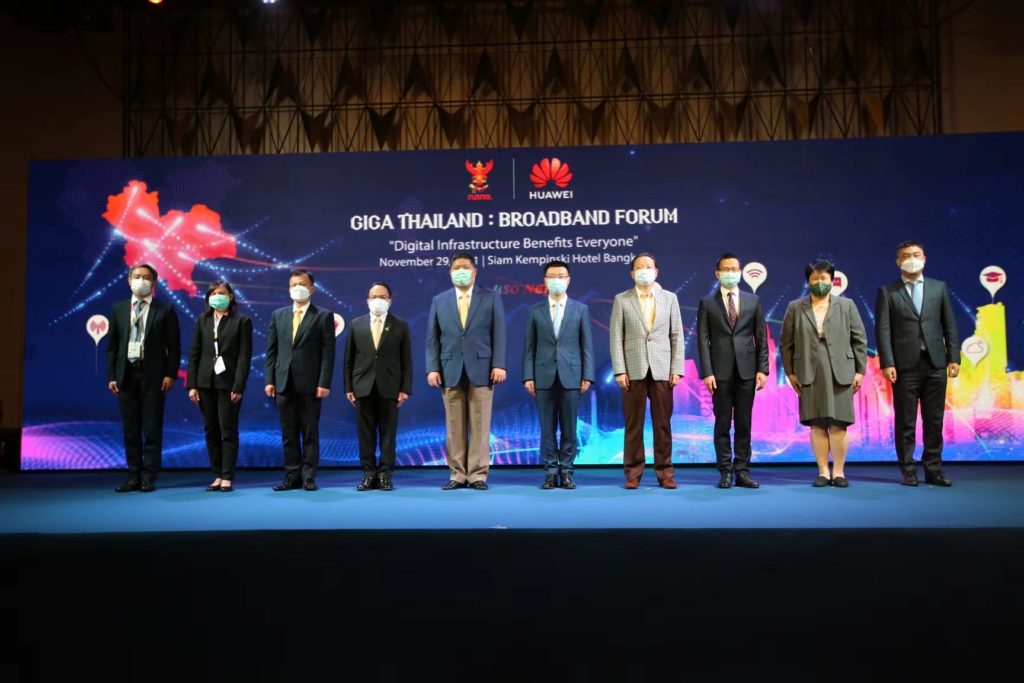The Office of the National Broadcasting and Telecommunications Commission (NBTC) partnered with Huawei Technologies (Thailand) Co., Ltd. to accelerate the fiber infrastructure development in Thailand at the “Giga Thailand: Broadband Forum”. The event was hosted under the theme “Digital Infrastructure Benefits Everyone.” The goal is to accelerate the fiber-based infrastructure in Thailand and raise the standards to the next level. The project also aims to future collaboration, with the support of the installation of fiber-based infrastructure to boost economy growth and moving toward Digital Thailand.
Trairat Viriyasirikul, Deputy Secretary General and acting Secretary General, Office of the National Broadcasting and Telecommunications Commission (NBTC), addressed the collaboration in his speech, saying that “Fiber-based broadband infrastructure is critical for the development of Thailand’s digital infrastructure in order to drive digital economy as well as the adoption of new technologies, innovative applications, and achieving the S-Curve across all industries in the country. Broadband infrastructure coverage must be accelerated and upgraded to the gigabits-speed standard. Moreover, the situation over the past two years shows us that broadband internet is very important for how we live our everyday life and it will become more and more important. The partnership today marks the start of our joint efforts to develop Thailand’s broadband infrastructure, which will in turn drive the country to becoming an ASEAN digital hub and help close the digital-divide gap in the country.”
Simon Lin, President of Huawei Asia Pacific, said “Digital infrastructure is benefiting individual lives. Technologies, such as broadband, 5G, cloud, and AI, keep our society together, and enable many people to work from home, connect with our loved ones, and access medical resources. 2022 will open a new chapter for digital infrastructure. I believe that with our joint efforts, we can create a fully connected and inclusive Giga Thailand;”.
Abel Deng, CEO of Huawei Technologies (Thailand) Co., Ltd., added that “The correlation of an overall technology can be interpreted. The density of our connections multiplied by the sheer amount of computing power at our disposal will ultimately determine the strength of the digital economy. The convergence of connectivity and computing will change all industries, whether it is a transportation, finance, or energy industry, and create new value for society. Fiber broadband has become a part of core infrastructure of digital economy, similar to water and electricity, and it will be a new driver for social development and economic growth.”
Puchapong Nodthaisong, Secretary General, Office of the National Digital Economy and Society Commission (ONDE), said, “Fiber-based connectivity is considered to be key ICT infrastructure for the Thai government. Thailand has witnessed rapid development of broadband networks and achieved network development goals. This will drive the country’s technological advances and economic and social development as well as rapid growth in the digital economy.”
Dr. Atsuko Okuda, Regional Director of International Telecommunication Union, Regional Office for Asia and the Pacific, said, “At the same time, the COVID-19 pandemic has highlighted the urgency of accelerating digital transformation. This means advancing the goals and targets of ITU’s Connect 2030 Agenda and leaving no one behind. Ensuring a creation of a safe and enabling environment towards digital transformation and innovation. Our Connect 2030 Agenda contributes to the UN Decade of Action to achieve the 2030 Agenda for Sustainable Development and SDG9 in particular: Build resilient infrastructure, promote inclusive and sustainable industrialization and foster innovation. Digital technologies, and the work of ITU, are vital to achieve all 17 SDGs”
Vichaow Rakphongphairoj, President of Telecommunications Association of Thailand under the Royal Patronage also said that “At the moment, Thailand broadband is facing many key issues such as a low fiber penetration rate per household, especially for old building and remote areas, wide disparity of internet speed, and disorganized telecommunication cables. Thai government should lay down measures to promote fiber deployment as fiber infrastructure will drive the future digitalization, enabling high speed broadband, 5G mmWave and the cloud.”
Under the ‘Giga Thailand: Broadband Forum’ corporation, the partnership is set to launch a Giga Thailand whitepaper, featuring a collection of recommendations on the accelerating of fiber-based infrastructure as well as its adoption and related policies for Thailand. NBTC and Huawei will work together to drive Thailand’s fiber broadband network in three key areas. First, the initiative will drive the adoption of fiber broadband as the new basic infrastructure for Thailand in the future, as well as expanding the coverage to improve the country’s connectivity index. Second, the collaborative effort aims to help close the digital-divide gap in Thailand. Finally, the initiative will enable Thailand digital transformation to boost the country’s economic growth which will contribute to a better quality life for Thais.
Source: Carl Byoir & Associates

